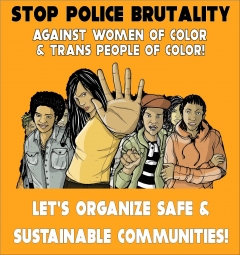
INCITE! is one of my favorite feminist organizing projects and I’m excited to spread the word about their gorgeous new website. If you don’t already know about their amazing anthology, The Color of Violence, I highly recommend picking it up (especially since I helped craft the chapter that intersects with trans issues, toot toot.) Even if you don’t have a copy, the website is right at your fingertips, right now. Go check it out!
I especially want to draw your attention to one of the centerpieces of their website launch, the Organizing Toolkit To Stop Law Enforcement Violence Against Women of Color & Trans People of Color. If you have any doubts as to whether police brutality is a feminist issue, their analysis does a much better job of explaining than I have recently. Their toolkit highlights the fact that law enforcement violence against women and trans people often becomes invisible, while at the same time stressing the need to work in coalition with other organizations that struggle against the police state, institutionalized violence against people of color, immigrant rights, and so forth. (See in particular the joint statement put out by INCITE! and Critical Resistance, the prison abolitionist organization founded by Angela Davis and others.) They’re simultaneously working to integrate a gender analysis into conversations about police brutality, and also raise awareness that this isn’t just a problem that happens to young, straight black men.
INCITE!’s toolkit addresses everything from law enforcement violence against marginalized women and trans folks on the streets to violence in immigration practices and against native communities, police brutality against sex workers, and strategies for community accountability — which could be an alternative to calling the police, especially for people and communities who can’t always do that. I’ll quote a couple of my favorite sections after the jump.
Also, check out this sweet poster version.
WHY A PROJECT ON LAW ENFORCEMENT VIOLENCE?
Law enforcement violence against women of color and trans people of color is largely invisible in discussions about police brutality. Similarly, discussions about “violence against women” rarely, if ever, meaningfully address violence perpetrated by law enforcement officers. As a result, police brutality against women of color and trans people of color is often unacknowledged, leaving our voices largely unheard and our experiences unaddressed.
Yet since the arrival of European colonists on this continent and the creation of slave patrols — the first state-sponsored law enforcement agencies in the U.S. — Native, Black, Latina, Asian, and Arab women and girls have been and continue to be harassed, profiled, strip searched, body cavity searched, raped, beaten, and murdered by agents of the state on a systematic basis. Such abuses remain widespread and entrenched across the country, in the context of the “war on drugs,” policing of sex and sex work, the “war of terror,” “quality of life,” “zero tolerance” and “broken windows” policing.
In addition to breaking the silence around law enforcement violence against women of color and trans people of color, we focus on violence by police and other law enforcement agents for two main reasons:
- First, to foreground the central role of law enforcement in the prison-industrial complex – they represent the front lines of the criminal injustice system, and are often primarily responsible for determining who will be targeted for heightened surveillance and policing, enforcing systemic oppressions based on race, gender, gender identity and expression, sexual orientation, immigration status, class and ability, and feeding people into the prison-industrial complex.
- Second, because mainstream responses to violence against women have relied almost exclusively on the police to protect us from violence, when in fact, police not only often fail to protect women of color and trans folks of color from interpersonal and community violence, they often perpetrate further violence against us, including when responding to calls for help.
When we think about police brutality, we tend to think primarily about the experiences of young men of color perceived to be heterosexual, and not about police brutality women and trans people of color experience daily. When we think about violence against women, we tend to think about interpersonal and community violence, like domestic violence and sexual assault, and not gender based violence by law enforcement agents. As a result, very little information and very few resources on police brutality and other forms of law enforcement violence against women of color and trans people of color exist at the national level.
We focus on law enforcement violence experienced by women of color and trans people of color of all genders because we recognize that law enforcement agents police race and gender simultaneously, and deem gender non-conformity, be it through acts or expression, a sign of disorder to be punished. As the political group TransJustice asserts, “Gender policing, like race-based policing, has always been part of this nation’s bloody history.”
We integrate an analysis of militarism because of the close collaboration between military and police forces in the “U.S.” and abroad, which involves sharing tactics, personnel, equipment, and targets, which include women and trans people of color at home and around the world.
Finally, they’re also looking for your feedback on the toolkit. Go to it!